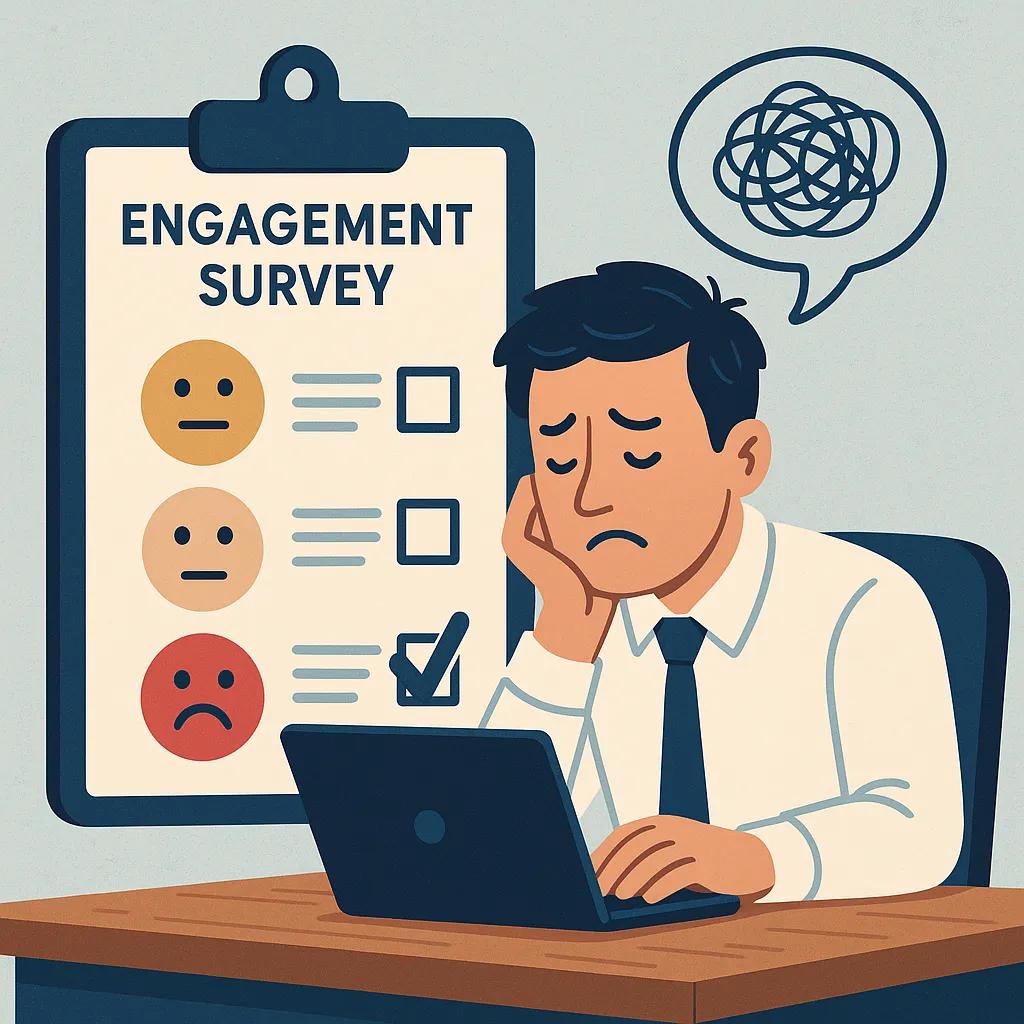Why More Feedback Isn't Creating Better Workplace
Organisations are more "data-driven" than ever — deploying quarterly pulse checks, annual engagement surveys, and sentiment dashboards with colourful charts and AI insights.
But despite this rise in employee feedback tools, culture remains stuck.
- 📉 Trust is declining
- 📉 Burnout is rising
- 📉 Performance gains have plateaued
- 📉 Trust is declining
It's not for lack of listening.
It's for lack of *reinforcement*.
At Appellon, we've diagnosed this widespread stagnation as what we call"The Engagement Survey Trap."
It looks like this:
Survey → Analyse → Report → Strategise → Wait → Repeat
(Meanwhile, nothing changes)
The result? A growing sense among employees that their voice doesn't drive action — a condition that neuroscience callslearned helplessness.
How Sentiment-Only Systems Create Learned Helplessness
According to Appellon's whitepaper *The Next Generation Workforce*, repeatedly asking people how they feel — without reinforcing progress or agency — has created an environment that is:
- Over-personalised
- Emotionally loaded
- Chronically anxious
- Over-personalised
"We have unintentionally fostered an increasingly personalised, stressed, and anxious workforce environment by focusing on what we think the individual needs and wants."
>
— Sue Jauncey, Organisational Psychologist and Appellon Founder
When employees express dissatisfaction and nothing changes, the brain encodes a powerful message:
*"There's no point trying."*
This islearned helplessness at scale— a neurological state where effort no longer links to outcome, and passivity becomes the path of least resistance.
The Neuroscience of Progress (and Why It Works Better Than Sentiment)
Here's what the brain needs to stay engaged:
- ✅ rogress
- ✅ onnection
- ✅ sense of contribution
- ✅ rogress
When these are reinforced, the brain releasesoxytocin— the neurochemical responsible for trust, motivation, and psychological safety.
When they're missing,cortisoltakes over — triggering stress responses like withdrawal, cynicism, and fear-based compliance.
Progress is not just motivational. It's biological.
And it's the single greatest antidote to disengagement.
From Insight to Impact: How Appellon Breaks the Feedback Loop
Appellon doesn't run sentiment surveys.
We replace outdated data models with a real-time,behaviour-based reinforcement systemthat creates movement, not just metrics.
Here's how it works:
✅ Tech-Driven Coaching
Personalised behavioural insights that adapt based on consumption, context, and attitude trends — in real time.
⏱️ 10-Minute Micro-Learnings
Fast, targeted sessions that engage employees weekly to reflect, realign, and reset behaviours in psychologically safe ways.
🔁 Real-Time Behaviour Reinforcement
Because change isn't an event. It's a practice. Every interaction builds momentum and strengthens collective alignment.
Over time, organisations shift from measuring how people *feel*, to reinforcing what they *do* — together.
📈 What Happens When You Reinforce Behaviour Instead of Sentiment?
The impact is both measurable and scalable:
- ✅ ncreased trust in leadership
- ✅ ecreased unplanned leave and burnout
- ✅ tronger alignment between intent and action
- ✅ rganisational performance becomes a byproduct of daily progress
- ✅ ncreased trust in leadership
"Transformative in comparison to extracting data from surveys. The level of consumption is mind-blowing."
>
— NHS Executive
From Data to Direction: The Appellon Difference
If you're relying on sentiment to measure culture, you're missing the most critical factor in performance:
Behavioural reinforcement.
Appellon is the psych-tech solution for leaders who want more than dashboards.
- We offer astructure, not a survey.
- We embedbehaviour, not branding.
- We createmovement, not just measurement.
- We offer astructure, not a survey.
The best workplaces don't just collect feedback.
They reinforce the right attitudes — daily.
